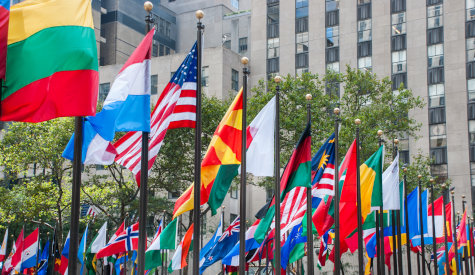As corruption becomes increasingly transnational in nature, challenges need to be addressed at a global scale, and international cooperation is required to effectively prevent and combat corruption offences.
The United Nations General Assembly held a special session against corruption from 2 to 4 June 2021 to address these challenges and improve international cooperation.
Commitments emerging from the special session
A report from the UN General Assembly outlines the common commitments reached at the special session between Heads of State and Government, ministers and representatives of Member States, and parties to the United Nations Convention against Corruption (UNCAC), to prevent and combat corruption and strengthen international cooperation.
General resolutions
All parties:
- Pledged to pursue a multilateral approach in preventing and combating corruption, reaffirming their commitment to the UNCAC, and to integrating it into domestic legal systems as necessary.
- Reaffirmed their commitment to the achievement of the 2030 Agenda for Sustainable Development, which is interlinked with preventing and combatting corruption.
- Pledged to prevent and combat corruption and strengthen international cooperation with respect for human rights, justice, democracy and the rule of law.
- Recognised that corruption can undermine citizens’ trust, have a negative impact on governance and the enjoyment of all human rights such as access to basic services, and that these challenges have been exacerbated by the COVID-19 pandemic.
- Recognised that corruption is often transnational in nature, and reiterated the need for strong international cooperation in the prevention, detection, investigation and prosecution of corruption offences, as well as in the recovery and return of confiscated assets.
Preventive measures
All parties:
- Reaffirmed their responsibility to prevent corruption from occurring by putting in place preventive measures, policies and practices.
- Committed to ensuring that preventive measures address risk factors at all levels of society and economic sectors.
- Recognised the role of anti-corruption bodies and authorities, committing to grant them the necessary independence and provide them with the resources required to carry out their oversight functions.
- Agreed to apply anti-corruption measures for all public officials, including executives and law enforcement officers, as well as prosecutors and members of parliaments and judicial bodies.
- Committed to increasing transparency and accountability in the management of public finances and in government procurement, which present corruption risks.
- Recognised that Member States are responsible for ensuring transparent, free and fair elections.
- Will take measures to prevent corruption involving the private sector, including through the establishment of public-private partnerships in the prevention of and fight against corruption.
- Committed to making efforts in international cooperation and taking appropriate measures to enhance beneficial ownership transparency to combat money laundering.
- Committed to instituting comprehensive domestic regulatory and supervisory regimes for banks and non-bank financial institutions, to deter money laundering.
- Agreed to raise public awareness about corruption.
Criminalisation and law enforcement
All parties:
- Committed to criminalising, investigating, and prosecuting corruption and related offences in the public and private sectors.
- Were urged to adapt their legislation and regulations, pursuant to article 65 of the UNCAC, to comply with the relevant obligations to establish as criminal offences the bribery of national public officials, the active bribery of foreign public officials and officials of public international organisations, embezzlement, money laundering and obstruction of justice.
- Committed to strengthening efforts to build the capacity of law enforcement and judicial authorities for the successful investigation and prosecution of corruption.
- Agreed to enable effective domestic cooperation amongst anti-corruption authorities, police, investigative, prosecutorial and judicial authorities, financial intelligence units and administrative and oversight bodies.
- Committed to protecting those who expose and report corruption.
- Committed to criminalising obstruction of justice.
International cooperation
All parties:
- Reaffirmed the importance of international and multilateral cooperation and agreed to afford other States the widest measure of mutual legal assistance in investigations, prosecutions and judicial proceedings in relation to the offences covered by the UNCAC.
- Agreed to cooperate to curb the cross-border movement of persons involved in the commission of corruption offences and property, which includes funds derived from the commission of corruption offences.
- Recognised the importance of implementing bilateral and multilateral agreements or arrangements, including on extradition, mutual legal assistance and the return of confiscated proceeds of corruption offences.
- Committed to adequately addressing requests based on non-criminal proceedings, including civil, administrative non-conviction-based proceedings, as well as those related to information concerning unexplained assets held by public officials.
Asset recovery
All parties:
- Emphasised that asset recovery is a fundamental principle of the UNCAC.
- Committed to taking domestic measures to investigate, trace, freeze, seize, confiscate and return proceeds of corruption, and to strengthen international cooperation in asset recovery.
- Committed to strengthen the capacities of central and other competent authorities to effectively recover assets.
- Agreed to improve mutual legal assistance processes to ensure more successful asset recovery proceedings.
- Recognised the importance of ensuring the effective administration and disposal of confiscated assets, such as compensating victims of the crime and the social reuse of assets for the benefit of communities.
Technical assistance
All parties:
- Acknowledged the importance of effective technical assistance for strengthening national capacities to prevent and fight corruption.
- Committed to providing technical assistance to other States, including in the form of material support and capacity-building and training.
- Agreed to strengthen technical assistance and training programs.
- Pledged to continue sharing information on the provision of technical assistance and needs for such assistance.
Conclusion
Following the special session of the UN General Assembly against corruption, all States and parties to the United Nations Convention against Corruption committed to combatting corruption through implementing preventive measures, enhancing criminalisation and law enforcement, and strengthening international cooperation, asset recovery and technical assistance.
These are key steps to the achievement of the 2030 Agenda for Sustainable Development, and to upholding human rights, justice, democracy and the rule of law.



